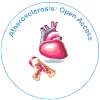எங்கள் குழு ஒவ்வொரு ஆண்டும் அமெரிக்கா, ஐரோப்பா மற்றும் ஆசியா முழுவதும் 1000 அறிவியல் சங்கங்களின் ஆதரவுடன் 3000+ உலகளாவிய மாநாட்டுத் தொடர் நிகழ்வுகளை ஏற்பாடு செய்து 700+ திறந்த அணுகல் இதழ்களை வெளியிடுகிறது, இதில் 50000 க்கும் மேற்பட்ட தலைசிறந்த ஆளுமைகள், புகழ்பெற்ற விஞ்ஞானிகள் ஆசிரியர் குழு உறுப்பினர்களாக உள்ளனர்.
அதிக வாசகர்கள் மற்றும் மேற்கோள்களைப் பெறும் திறந்த அணுகல் இதழ்கள்
700 இதழ்கள் மற்றும் 15,000,000 வாசகர்கள் ஒவ்வொரு பத்திரிகையும் 25,000+ வாசகர்களைப் பெறுகிறது
குறியிடப்பட்டது
- கூகுள் ஸ்காலர்
- RefSeek
- ஹம்டார்ட் பல்கலைக்கழகம்
- EBSCO AZ
- பப்ளான்கள்
- ICMJE
பயனுள்ள இணைப்புகள்
அணுகல் இதழ்களைத் திறக்கவும்
இந்தப் பக்கத்தைப் பகிரவும்
சுருக்கம்
Osteoblastic Differentiation of Vascular Smooth Muscle Cells
Shuichi Jono, Yoshiki Nishizawa, Katsuhito Mori, Atsushi Shioi, Hirotoshi Morii
Atherosclerotic lesions are frequently associated with vascular calcification. Additionally, the process of atherosclerotic calcification shares a number of characteristics with skeletal tissue mineralization. At the onset of atherosclerotic lesions, we hypothesized that vascular smooth muscle cells might acquire osteoblastic characteristics.Using an in vitro calcification model, we examined the effect of dexamethasone (Dex), which is well known to be a potent stimulator of osteoblastic differentiation in vitro, on vascular calcification in this study. Dex increased the calcification of bovine vascular smooth muscle cells (BVSMCs) in a dose- and time-dependent manner, as we demonstrated. Alkaline phosphatase activity, procollagen type I carboxy-terminal peptide production, and cAMP responses to parathyroid hormone in BVSMCs were also enhanced by Dex in osteoblasts. In addition, we compared Dex’s effects on BVSMCs and Saos-2 cells and examined its effects on human osteoblast-like (Saos-2) cells. BVSMCs were less affected by Dex than Saos-2 cells were by its effects on alkaline phosphatase activity and the cAMP response to parathyroid hormone.We found that Dex increased the gene expression of both transcription factors, and that Osf2/Cbfa1, a key transcription factor in osteoblastic differentiation, was expressed in both BVSMCs and Saos-2 cells. According to these findings, in vitro osteoblastic differentiation of BVSMCs may be enhanced by Dex.
பாடத்தின் அடிப்படையில் இதழ்கள்
- இயற்பியல்
- இரசாயன பொறியியல்
- உணவு மற்றும் ஊட்டச்சத்து
- உயிர் மருத்துவ அறிவியல்
- உயிர்வேதியியல்
- கணிதம்
- கணினி அறிவியல்
- கால்நடை அறிவியல்
- சமூக & அரசியல் அறிவியல்
- சுற்றுச்சூழல் அறிவியல்
- தகவலியல்
- தாவர அறிவியல்
- நர்சிங் & ஹெல்த் கேர்
- நானோ தொழில்நுட்பம்
- நோயெதிர்ப்பு மற்றும் நுண்ணுயிரியல்
- புவியியல் மற்றும் பூமி அறிவியல்
- பொது அறிவியல்
- பொருள் அறிவியல்
- பொறியியல்
- மரபியல் & மூலக்கூறு உயிரியல்
- மருத்துவ அறிவியல்
- மருத்துவ அறிவியல்
- மருந்து அறிவியல்
- வணிக மேலாண்மை
- விவசாயம் மற்றும் மீன் வளர்ப்பு
- வேதியியல்
மருத்துவ & மருத்துவ இதழ்கள்
- அறுவை சிகிச்சை
- இதயவியல்
- இனப்பெருக்க மருத்துவம்
- இம்யூனாலஜி
- இரத்தவியல்
- உடல் சிகிச்சை மற்றும் மறுவாழ்வு
- எலும்பியல்
- கண் மருத்துவம்
- கண் மருத்துவம்
- காஸ்ட்ரோஎன்டாலஜி
- குழந்தை மருத்துவம்
- சிறுநீரகவியல்
- சுகாதாரம்
- தொற்று நோய்கள்
- தோல் மருத்துவம்
- நச்சுயியல்
- நரம்பியல்
- நர்சிங்
- நீரிழிவு மற்றும் உட்சுரப்பியல்
- நுண்ணுயிரியல்
- நுரையீரல் மருத்துவம்
- பல் மருத்துவம்
- மனநல மருத்துவம்
- மயக்கவியல்
- மரபியல்
- மருத்துவ ஆராய்ச்சி
- மருந்து
- மூலக்கூறு உயிரியல்

 English
English  Spanish
Spanish  Chinese
Chinese  Russian
Russian  German
German  French
French  Japanese
Japanese  Portuguese
Portuguese  Hindi
Hindi